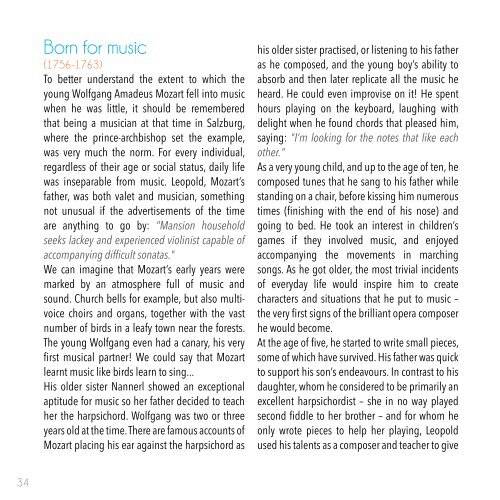Livret-Mozart-Levin-Poulet-La-Goillotte-Le-Palais-des-D%C3%A9gusteurs
Livret-Mozart-Levin-Poulet-La-Goillotte-Le-Palais-des-D%C3%A9gusteurs
Livret-Mozart-Levin-Poulet-La-Goillotte-Le-Palais-des-D%C3%A9gusteurs
You also want an ePaper? Increase the reach of your titles
YUMPU automatically turns print PDFs into web optimized ePapers that Google loves.
Born for music<br />
(1756-1763)<br />
To better understand the extent to which the<br />
young Wolfgang Amadeus <strong>Mozart</strong> fell into music<br />
when he was little, it should be remembered<br />
that being a musician at that time in Salzburg,<br />
where the prince-archbishop set the example,<br />
was very much the norm. For every individual,<br />
regardless of their age or social status, daily life<br />
was inseparable from music. <strong>Le</strong>opold, <strong>Mozart</strong>’s<br />
father, was both valet and musician, something<br />
not unusual if the advertisements of the time<br />
are anything to go by: "Mansion household<br />
seeks lackey and experienced violinist capable of<br />
accompanying difficult sonatas."<br />
We can imagine that <strong>Mozart</strong>’s early years were<br />
marked by an atmosphere full of music and<br />
sound. Church bells for example, but also multivoice<br />
choirs and organs, together with the vast<br />
number of birds in a leafy town near the forests.<br />
The young Wolfgang even had a canary, his very<br />
first musical partner! We could say that <strong>Mozart</strong><br />
learnt music like birds learn to sing...<br />
His older sister Nannerl showed an exceptional<br />
aptitude for music so her father decided to teach<br />
her the harpsichord. Wolfgang was two or three<br />
years old at the time. There are famous accounts of<br />
<strong>Mozart</strong> placing his ear against the harpsichord as<br />
his older sister practised, or listening to his father<br />
as he composed, and the young boy’s ability to<br />
absorb and then later replicate all the music he<br />
heard. He could even improvise on it! He spent<br />
hours playing on the keyboard, laughing with<br />
delight when he found chords that pleased him,<br />
saying: "I’m looking for the notes that like each<br />
other."<br />
As a very young child, and up to the age of ten, he<br />
composed tunes that he sang to his father while<br />
standing on a chair, before kissing him numerous<br />
times (finishing with the end of his nose) and<br />
going to bed. He took an interest in children’s<br />
games if they involved music, and enjoyed<br />
accompanying the movements in marching<br />
songs. As he got older, the most trivial incidents<br />
of everyday life would inspire him to create<br />
characters and situations that he put to music –<br />
the very first signs of the brilliant opera composer<br />
he would become.<br />
At the age of five, he started to write small pieces,<br />
some of which have survived. His father was quick<br />
to support his son’s endeavours. In contrast to his<br />
daughter, whom he considered to be primarily an<br />
excellent harpsichordist – she in no way played<br />
second fiddle to her brother – and for whom he<br />
only wrote pieces to help her playing, <strong>Le</strong>opold<br />
used his talents as a composer and teacher to give<br />
34


